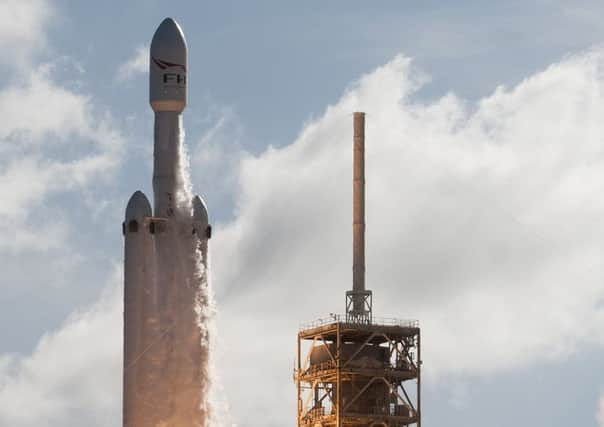Martyn McLaughlin: Super-rich '˜philanthropists' are usurping democracy


A little over a century has passed since Frank P Walsh, a progressive lawyer from St Louis, Missouri, voiced his disgust at the attempts by a Scottish immigrant to devote himself to the betterment of mankind.
Walsh, the chair of a US congressional inquiry into industrial relations, ruled that far from constituting a gift, such a lofty notion belied something altogether more sinister.
Advertisement
Hide AdAdvertisement
Hide AdOnly the year before, the Scot, who rose from humble beginnings in a Fife weaver’s cottage to become a titan of industry, had set up a new entity. It was a corporation in name, but its ethos was charitable.
He was 76 at the time and, in the twilight of his life, one of his few unfulfilled ambitions was to see his immense fortune go towards the greater good.
Walsh, however, was unmoved. The offer, he said, was “a menace to the future political and economic welfare of the nation”.
In the face of such ingratitude, the US should be thankful that Andrew Carnegie never wavered from his philanthropic pursuit, although equally, it would be rash to simply dismiss Walsh as petty-minded.
In its first year, the Carnegie Corporation of New York spent close to £100 million, a sum nearly twice that of the 1912 federal budget surplus. What the Scot intended as a show of benevolence was, not unreasonably, viewed by some as an exercise of absolute power.
If Carnegie single-handedly redefined the role and responsibilities of the super wealthy in modern society, the tension aroused by his intentions remains tangible in the 21st century.
Last week, Elon Musk, an anagram masquerading as a philanthro-capitalist, celebrated the successful launch of Falcon Heavy, the powerful rocket he bankrolled that will provide the US with a heavy-lift capability not witnessed since the golden age of the Apollo programme.
The triumph, Mr Musk believes, not only puts him far ahead of his rivals in the commercial spaceflight industry, but will ultimately benefit all of mankind. His end game is to provide the technology so that “millions of people are living and working in space” and, ultimately, to spirit humans to the surface of Mars before the middle of the century.
Advertisement
Hide AdAdvertisement
Hide AdEven if only one of those grandiose goals is realised, it would represent one of the greatest leaps forward of any age. Yet at a time when Mr Musk is being lauded, there is something disquieting about his seeming monopolisation of scientific progress in this field.
The issue is not the way his space programme – the ultimate alpha male manifestation of ambition – invites comparisons with the megalomaniacal delusions of Moonraker’s Hugo Drax, although it would be fair to say that Mr Musk is not a man without ego.
Rather, the problem lies with how his reach for the stars is indicative of modern philanthropy’s untrammelled influence. Increasingly, it not only aids the work of governments; it supplants it. It is important, of course, to acknowledge the remarkable work achieved by the ranks of billionaires who, like Carnegie before them, feel an obligation to improve the world around them.
The Bill and Melinda Gates Foundation, for example, has helped spearhead efforts to all but eradicated polio from the face of the earth. Even those philanthropic actors who position themselves on one side of the political divide, such as George Soros or Michael Bloomberg, have largely confounded partisan sniping by acting upon a desire to improve life for all.
But for every Gates or Soros there is a Musk, a man so restless that you suspect he would not be satisfied were he to be handed the moon on a stick. In small doses, that can be an appreciable quality. The private sector is often the engine of innovation and it should not be neutered.
Yet where do we draw the line when the priorities of billionaires begin to impact on policy? Can we allow individuals to reshape the world according to their own vision in the hope the rest of us might benefit? With rising income inequality, the disruptive influence of the super-rich philanthropists is increasingly intersecting with the work of governments, allowing the few an immense and unchecked power, purportedly for the good of the many. Often, their reach extends even further.
In the US, for instance, a parallel form of free market education exists alongside the state equivalent, financed by opaque charitable foundations which enjoy tax exemption status. Supporters of these privately managed charter schools say they empower parents, while their critics point to high stakes testing and centralised decision-making. The efficacy of the model is besides the point; what matters is how billionaires are in open competition with the state.
As the rich grow richer and public spending becomes even more straitened, it seems inevitable this trend will intensify, and with it, pressure for reform and deregulation.
Advertisement
Hide AdAdvertisement
Hide AdWhat makes philanthropy a force for good – its ability to finance issues overlooked or ignored by government – is also its Achilles heel. The impulses of billionaires do not always dovetail with the needs of society.
A century on, the hostility shown by Frank P Walsh to the emerging class of professional philanthropists may seem improvident, but we would do well to employ a little of his scepticism.
After all, what will Mr Musk do when there are no more worlds to conquer?
